Jewish American Heritage Month
We celebrate Jewish American Heritage Month (JAHM) this month with a selection of histories, novels, stories, and cookbooks on our shelves.
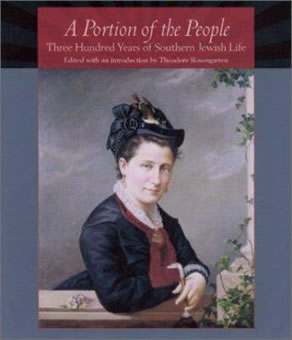
A Portion of the People: Three Hundred Years of Southern Jewish Life
In the year 1800, South Carolina was home to more Jews than any other place in North America. As old as the province of Carolina itself, the Jewish presence has been a vital but little-examined element in the growth of South Carolina's cities and towns, in the economy of slavery and post-slavery society, and in the creation of American Jewish religious identity.
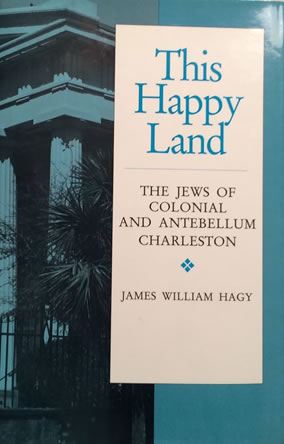
This Happy Land: the Jews of Colonial and Antebellum Charleston
Includes information on places of origin, marriages, children, and deaths. Examines the roles that women played in business, the causes of mortality, the antebellum Jewish family, the common aspects of life, and relations between Jews and African-Americans.
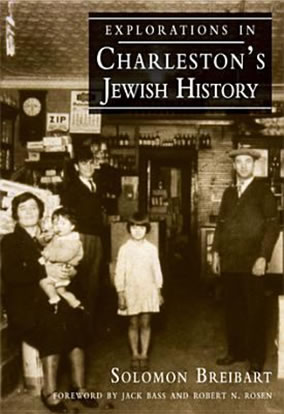
Explorations in Charleston’s Jewish History
In its over three hundred years of history, Charleston, South Carolina, has been known for many things. One of the most intriguing aspects of its past - and present - is its dynamic Jewish community.
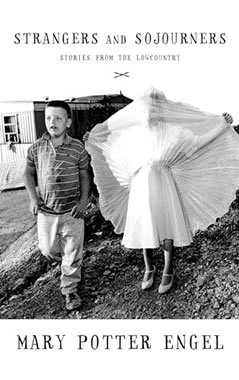
Strangers and Sojourner: Stories from the Lowcountry
In a small Southern town, a young Jewish doctor seeks to both do his job, and fit in to an alien culture, in this uniquely told story of village life that demonstrates great compassion for the loners, outcasts, and oddballs one finds in any small town.
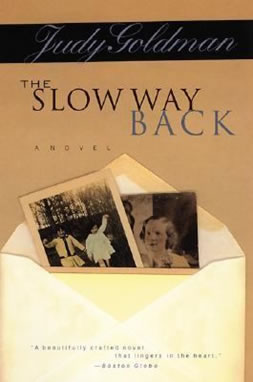
The Slow Way Back: A Novel
At the age of fifty, a woman in the South awakens to her almost-forgotten Jewish heritage. It happens to Thea McKee of North Carolina after she finds letters by her grandmother from Denmark and has them translated from the Yiddish.
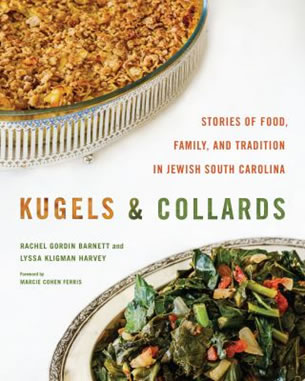
Kugels & Collards: Stories of Food, Family, and Tradition in Jewish South
Where people go, so goes their food. In Kugels & Collards: Stories of Food, Family, and Tradition in Jewish South Carolina, Rachel Gordin Barnett and Lyssa Kligman Harvey celebrate the unique and diverse food history of Jewish South Carolina. They gather stories and recipes from diverse Jewish sources--Sephardic and Ashkenazi families who have been in the state for hundreds of years, descendants of Holocaust survivors, and more recent immigrants from Russia and Israel--and explore how cherished dishes were influenced by available ingredients and complemented by African American and regional culinary traditions. These stories are a vital part of the South's "Jewish geography" and foodways, stretching across state lines to shape southern culture. On the southern Jewish table, many cultures are savored.

Jewish Sanctuary in the Atlantic World: A Social and Architectural History
Examines Jewish heritage as it expanded among the continents and islands linked by the Atlantic Ocean between the mid fifteenth and early nineteenth centuries
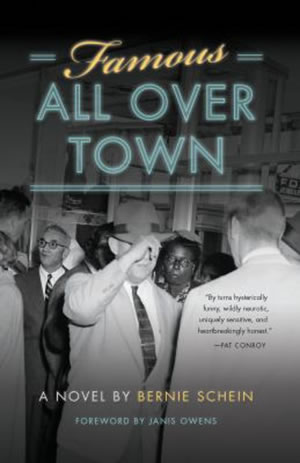
Famous All Over Town: A Novel
A comically candid novel of the small-town South, rampant with revelations from bedrooms, courtrooms, and all points in between. Novelist Walker Percy once said that the only remaining unexplored territory in Southern literature was the Jewish Southerner. "Famous All Over Town," the first novel from Southern storyteller Bernie Schein, stakes a claim on Percy's unexplored terrain with a comically candid multigenerational account of two Jews, a Lowcountry native and a northern transplant, at the epicenter of momentous events in the sleepy Southern coastal hamlet of Somerset, a fictitious stand-in for Schein's native Beaufort, South Carolina. Schein's diverse and memorable cast includes Southern Jewish lawyer Murray Gold and his foil, displaced New York psychiatrist Bert Levy; emotionally scarred USMC drill sergeant Jack McGowan and his alluring and unconventional wife, Mary Beth; corrupt and adulterous sheriff Hoke Cooley, his deeply conservative wife, Regina, and their violent son, Boonie; African American madam and later city councilwoman Lila Trulove (also Hoke's mistress), her brilliant daughter, Elizabeth, and her conflicted Harvard-bound son, Driver; fallen Southern belle turned voice of a generation Arlanne Palmer; remorseful Vietnam veteran and flamboyant transvestite Royal Cunningham; and inspirational schoolteacher Pat Conroy. "Famous All Over Town" also uses its web of interconnected storylines to make its setting, the eponymous town itself, a central character with a personality and an arc as complete as that of any other member of the deftly rendered cast. Delving beneath the surface of the Southern status quo, Schein's tale follows these interconnected lives through the private and public upheavals in small-town life from the turbulent 1960s to the eve of the new millennium, confronting the ramifications of the civil rights era, Vietnam, Watergate, and--closer to home--a deadly version of the infamous Ribbon Creek incident. Somerset's colorful citizens also confront their own repressed memories, conflicted identities, burgeoning ambitions, and romantic entanglements. Even as events unfold to often-uproarious effect, Schein's novel holds true to a deeply realized sense of intimacy and authenticity in the interactions of its myriad characters as revelations expose how these disparate lives are conjoined in surprising ways. Shifting points of view place readers squarely in the mindsets of many of Somerset's key citizens as Schein lovingly and laughingly invites us to reconsider what it means in the modern South to be white, black, Jewish, Christian, military, civilian, sane, insane, old, young, male, female, gay, and straight--and to be of a place rather than merely in it.
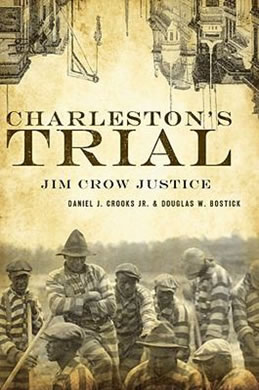
Charleston’s Trial: Jim Crow Justice
June 1910, Charleston, South Carolina. A Jewish merchant, Max Lubelsky, lay murdered in his clothing store on Upper King Street. The black man eventually convicted of the crime was arrested several weeks later as an angry mob called for his lynching. What followed became the story of one man's quiet protestations of innocence in the face of overwhelming condemnation by the white community. Drawing on local historical records and detailed court transcripts, Charleston historians Danny Crooks and Doug Bostick give an intimate account of the proceedings, as well as provide the historical background on the vices, violence and victims of the Holy City during the Jim Crow era. Join them as they reveal the tale of a man whom justice passed by in the hot Southern summer.
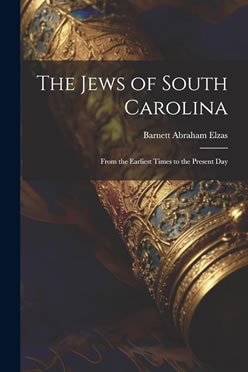
The Jews of South Carolina: From the Earliest Times to the Present Day
Biographical sketches: Dr. Simon Baruch ; C. Henry Cohen ; Judah Barrett Cohen ; Dr. David Camden de Leon ; Edwin de Leon ; Ex-Judge A. J. Dittenhoefer ; Judge David Leventritt.
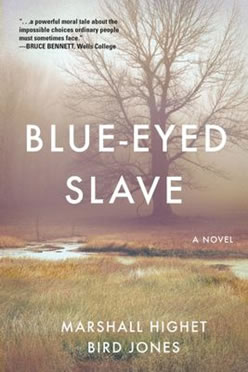
Blue-Eyed Slave
It is 1764 in Charles Town, South Carolina, and Harry's school for enslaved children has been in full swing for twenty years, despite the Negro Act of 1740. An enslaved person himself, Harry finds an unlikely ally in Hannah, a young Jewish girl from town who tutors Bintü, a recent acquisition of the prominent Reverend and Mistress Harte. But his school begins to feel the pressure as political winds shift and the Stamp Act causes revolt, uproar, and armed protests. Caught in the crossfire of impending revolution and increased animosity towards an educated enslaved population, Harry-and ultimately the two girls-will find their faith and integrity sorely tested. With relentless attention to historical accuracy, Blue-Eyed Slave levels an unflinching gaze at the cruelties of enslavement and shows that although human cruelty may be universal, the same is true for kindness and bravery.


